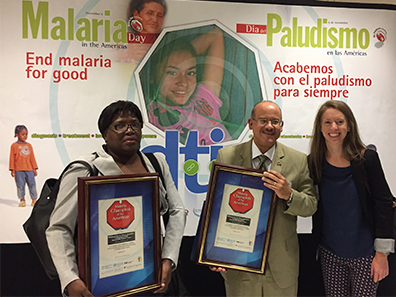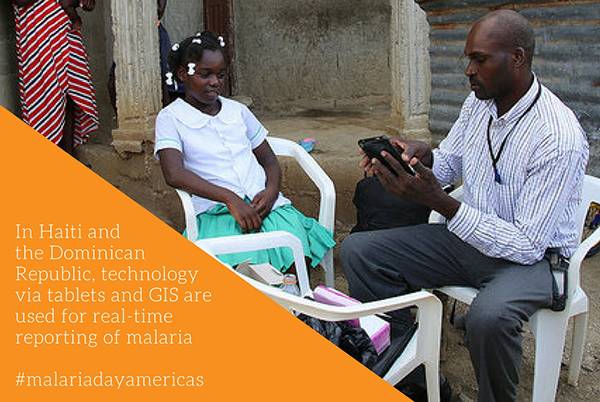You are here
Haiti and the Dominican Republic Honored as a Malaria Champion of the Americas
Today is Malaria Day in the Americas. As part of the Malaria Zero consortium helping to eliminate malaria from Haiti and the Dominican Republic by 2020, we celebrate Malaria Day in the Americas as an important opportunity to recognize progress and challenges to malaria elimination in the region.
The ambitious vision of eliminating malaria in the Americas is within our reach. According to the Pan American Health Organization (PAHO) there are 21 countries in the Americas where malaria is still endemic, with 28 million people still living in areas of high risk. The good news is that 19 of these 21 countries have committed to elimination, including Haiti and the Dominican Republic, and progress is being made.
The island of Hispaniola, where these two countries are located, is the last remaining area with endemic malaria in the Caribbean. The commitments and collaboration between the two governments of these countries has resulted in real progress towards elimination, and spurred innovative strategies to control malaria transmission across their shared border. The cross-border collaboration first began in 2006.
In true partnership Haiti’s National Malaria Control Program (PNCM) within the Ministry of Public Health and Population (MSPP), has worked seamlessly with the Dominican Republic’s Ministry of Public Health and Social Assistance’s National Center for the Control of Tropical Diseases (CENCET) to harmonize malaria diagnosis, treatment, and surveillance interventions across the border communities of Ouanaminthe and Dajabón.
The project along the border utilized innovative technology by establishing real-time reporting of malaria data with tablets and digital mapping of malaria cases. The programs effectively engaged the broad community of the private sector, traditional healers, mass media, mothers, children and others to ensure individuals who are highly mobile or live in remote areas had access to early diagnosis and treatment of malaria. This joint effort has reduced new cases of malaria at the border and the imported cases in the border areas of Ouanaminthe and Dajabón; the rate of positive cases decreased from 3.5 percent in 2012 to 0.3 percent in 2016. Lessons learned from this successful effort are now being used across Haiti, which has reduced malaria cases in the country by half since 2010.
 In recognition of this strong collaboration, innovative approach, and remarkable progress, the cross-border project of PNCM and CENCET has been bestowed the esteemed 2017 Malaria Champions of the Americas Award. This award honors innovative efforts that have significantly contributed to overcoming the challenges of malaria in communities, countries, and the region. Since the award was first bestowed in 2009, there have been 27 winners, and this year marks the first time that Haiti and the Dominican Republic have been jointly recognized for their contributions to malaria elimination in the region.
In recognition of this strong collaboration, innovative approach, and remarkable progress, the cross-border project of PNCM and CENCET has been bestowed the esteemed 2017 Malaria Champions of the Americas Award. This award honors innovative efforts that have significantly contributed to overcoming the challenges of malaria in communities, countries, and the region. Since the award was first bestowed in 2009, there have been 27 winners, and this year marks the first time that Haiti and the Dominican Republic have been jointly recognized for their contributions to malaria elimination in the region.
The Malaria Consortium is proud to partner with PNCM and CENCET. Their collective work to achieve meaningful health impact under challenging conditions, including the 2010 earthquake, Hurricane Matthew in 2016 and Hurricane Irma in 2017, offer inspiration to us all. Malaria Zero is looking forward to continuing to support the Ministries of Health to accelerate progress toward this momentous goal.
We look forward to working together and celebrating together the next win—malaria elimination on the island.
Photo (l-r) Meme Belcina, malaria department coordinator for the Northeast at MSPP; Dr. José Manuel Puello, director of population health management of the DR Ministry of Public Health and Social Assistance; Phillippa Chadd, CDC Foundation senior program officer.

